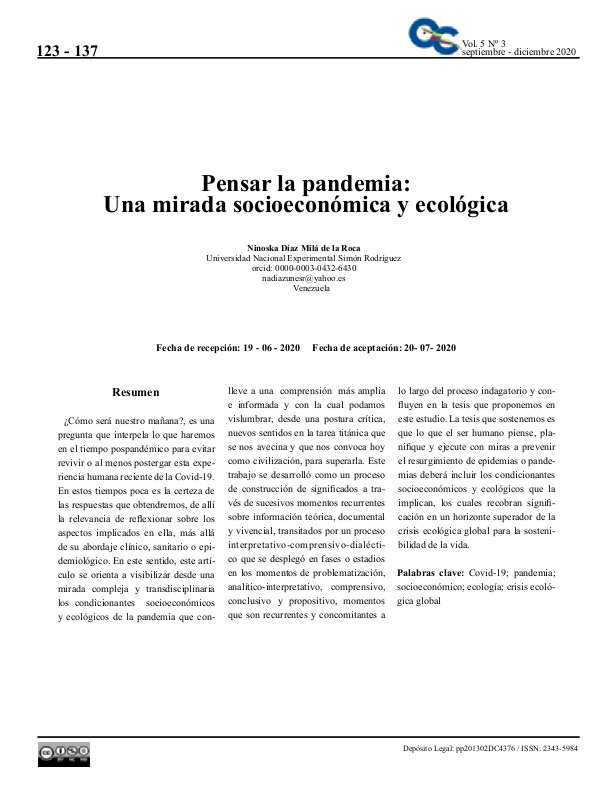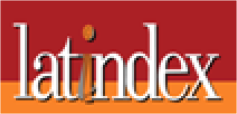Thinking about the pandemic: A socio-economic and ecological perspective
Keywords:
Covid-19; pandemic; socio-economic; ecology; global ecological crisisAbstract
What will our tomorrow be like, is a question that questions what we will do in post-pandemic time to avoid reliving or at least postponing this recent human experience of Covid-19. In these times there is little certainty of the answers we will get, hence the relevance of reflecting on the aspects involved in it, beyond its clinical, health or epidemiological approach. In this sense, this article aims to make visible, from a complex and transdisciplinary viewpoint, the socio-economic and ecological determinants of the pandemic, leading to a broader and more informed understanding and with which we can glimpse, from a critical stance, new meanings in the titanic task that lies ahead of us and that calls us today as a civilization, to overcome it. This work was developed as a process of construction of meanings through successive recurrent moments on theoretical, documentary and experiential information, passed through an interpretative-comprehensive-dialectical process that unfolded in phases or stages in the moments of problematization, analytical-interpretative, comprehensive, conclusive and propositional, moments that are recurrent and concomitant throughout the investigative process and converge in the thesis that we propose in this study. The thesis that we sustain is that what the human being thinks, plans and executes with a view to prevent the resurgence of epidemics or pandemics will have to include the socioeconomic and ecological conditioners that imply it, which recover meaning in a horizon that overcomes the global ecological crisis for the sustainability of life.
Downloads
References
Agudelo, N. (2016): La crisis ecológica global: consideraciones preliminares. En Revista Luna Azul ISSN 1909-2474 No. 43, julio - diciembre 2016. Recuperado en: http://www.scielo.org.co/scielo.php?script=sci_arttext&pid=S1909-24742016000200001
Bárcena, A. (2020). América Latina ha perdido el tren de la política industrial y la innovación, I. Fariza entrevista a A. Bárcenas Secretaria Ejecutiva de la Cepal. En Diario El País, 7 febrero 2020. Recuperado en: https://elpais.com/economia/2020/02/05/actualidad/1580921046_527634.html
Daszak P, Cunningham, A.A. (2002). Emerging Infectious Diseases. A key role for Conservation Medicine In: Aguirre AA, Ostfeld RS, Tabor GM, Pearl MC (eds). Conservation Medicine. Ecological Health in Practice. Oxford University Press, New York, USA, Pp 40-61.
Daszak P, Cunningham, AA. Y Hyatt, AD. (2003) . Infectious disease and amphibian population declines. Divers Distrb 9, 141-150.
Daszak, P;Cunningha y AD Hyatt. (2001). Anthropogenic environmental change and the emergence of infectious diseases in wildlife. Acta Trop 78, 103-116
Daszak P, AA Cunningham, AD Hyatt (2000). Emerging infectious diseases of wildlife-threats to biodiversity and human health. Science 287, 443-449.
Díaz de Mariña, N (2011).La dimensión política en la acción de las Empresas Transnacionales: Su impacto en la viabilidad del proyecto civilizatorio humano. En revista Ensayo y Error. Nueva Etapa. Año XX N° 40-41. Caracas
Escobar, Arturo (2005). El “postdesarrollo” como concepto y práctica social. En Daniel Mato (coord.), Políticas de economía, ambiente y sociedad en tiempos de globalización. Caracas: Facultad de Ciencias Económicas y Sociales, Universidad Central de Venezuela, pp. 17-31.
Fernández Durán, R (2010). El Antropoceno: la crisis ecológica se hace mundial» – «La expansión del capitalismo global choca con la Biosfera. Fundación de investigaciones sociales y políticas. Recuperado en: https://fisyp.org.ar/libro-el-antropoceno-la-crisis-ecologica-se-hace-m/
Gruner E (2011). Los avatares del pensamiento crítico, hoy por hoy. En Grüner, E.(Compilador) Nuestra América y el pensar crítico: fragmentos del pensamiento crítico de Latinoamérica y el Caribe. Buenos Aires: CLACSO, 2011.
Gudynas, E. (2020). El agotamiento del desarrollo: la confesión de la CEPAL. En Revista online América latina en movimiento. Recuperado en: https://www.alainet.org/es/articulo/204763
Harvey, D. (2004). El" nuevo" imperialismo: acumulación por desposesión. Socialist register,vol. 40. pp. 99-129. Recuperado en:clacso.org.ar/ar/libros/social/harvey.pdf
Johnson, CK;Hitchens PL;Pandit, PS et all (2020). Global shifts in mammalian population trends reveal key predictors of virus spillover risk. En Proceedings of the Royal Society B 287: 20192736. Recuperado en: http://dx.doi.org/10.1098/rspb.2019.2736
Lander, E y Arconada, S (2019). Crisis civilizatoria. Experiencias de los gobiernos progresistas y debates en la izquierda latinoamericana. Colección CALAS. ISBN 978-3-8394-4889-2. CALAS - Centro Maria Sibylla Merian de Estudios Latinoamericanos Avanzados en Humanidades y Ciencias Sociales. Bielefeld University Press. Bielefeld.
Medina-Vogel, G. (2010). Ecología de enfermedades infecciosas emergentes y conservación de especies silvestres. Archivos de medicina veterinaria, 42(1), 11-24. Recuperado en: https://dx.doi.org/10.4067/S0301-732X2010000100003
Mészáros I (2001). Mas allá del Capital. Hacia una teoría de la Transición. Edición de la Vicepresidencia del Estado Plurinacional de Bolivia, La Paz, Bolivia. Recuperado en:http://www.vicepresidencia.gob.bo/IMG/pdf/mas_alla_del_capital.pdf
Natanson, J. y Wilkis, A.(2018).El neoliberalismo del siglo XXI.Le Monde diplomatique. Edición Cono Sur e IDAES. Universidad Nacional de San Martin. Recuperado en:https://www.eldiplo.org/notas-web/el-neoliberalismo-del-siglo-xxi/
Pierre,D. y Laval, CH. (2019): El desorden global. Anatomía del nuevo neoliberalismo. | 24/07/2019 | Economía. Fuentes: Viento Sur. En revista Rebelión. Recuperado en:https://rebelion.org/anatomia-del-nuevo-neoliberalismo/
Riechmann J. (2000): Un mundo vulnerable. Ensayos sobre ecología, ética y tecnociencia. España: Catarata. 2000, p. 18.
Robinson, W.I (2013): Una teoría sobre el capitalismo global. Producción, Clase y Estado en un mundo trasnacional. México: Editores Siglo XXI
Talledo, M., & Zumaeta, K. (2009). Los virus Influenza y la nueva pandemia A/H1N1. Revista Peruana de Biología, 16(2), 227-238. Recuperado en:www.scielo.org.pe/scielo.php?script=sci_arttext&pid=S1727- 9332009000200018&lng=es&tlng=es.
Ornelas R y otros (2013): Crisis civilizatoria y superación del capitalismo. UNAM Instituto de Investigaciones Económicas, 2013. ISBN 978-607-02-4222-9
ONU 2019: Evaluación Global sobre la Biodiversidad y los Servicios de los Ecosistemas del Panel Intergubernamental sobre Biodiversidad y Servicios de los Ecosistemas (IPBES).Recuperado en: https://ipbes.net/news/ipbes-global-assessment-preview
WWF (2018). Informe Planeta Vivo - 2018: Apuntando más alto - Resumen. Grooten, M. y Almond, R.E.A.(Eds). WWF, Gland, Suiza. Recuperado en: https://wwfeu.awsassets.panda.org/downloads/lpr_2018_resumen.pdf
United Nations Development Programme and Oxford UNDP (2019): Poverty and Human Development Report. Recuperado en: http://hdr.undp.org/en/2019-MPI
Svampa, M (2012): Consenso de los Commodities, Giro Ecoterritorial y Pensamiento crítico en América Latina. En Movimientos socioambientales en América Latina. Revista Observatorio Social de América Latina. Consejo Latinoamericano de Ciencias Sociales.
Recuperado en:http://biblioteca.clacso.edu.ar/clacso/osal/20120927103642/OSAL32.pdf
Velasco, FJ, (2015).Potencialidad de la ecología social en el tránsito hacia la creación de comunalidades post-capitalistas. rrecuperado en: https://colectivokinkallavisual.wordpress.com/2015/05/25/una-breve-sintesis-sobre-la-potencialidad-de-la-ecologia-social-en-el-transito-hacia-la-creacion-de-comunalidades-post-capitalistas/

Downloads
Published
How to Cite
Issue
Section
License

This work is licensed under a Creative Commons Attribution-NoDerivatives 4.0 International License.







